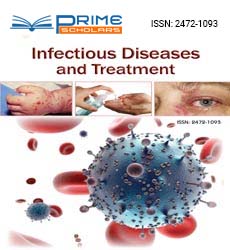Commentary - (2023) Volume 9, Issue 8
The Nasopharyngeal Microbiome in COVID-19: A Complex Interplay
Eiki Lina*
Department of Pathology, University of Mexico, Mexico
*Correspondence:
Eiki Lina,
Department of Pathology, University of Mexico,
Mexico,
Email:
Received: 01-Aug-2023, Manuscript No. IPJIDT-23-17891;
Editor assigned: 03-Aug-2023, Pre QC No. IPJIDT-23-17891 (PQ);
Reviewed: 17-Aug-2023, QC No. IPJIDT-23-17891;
Revised: 22-Aug-2023, Manuscript No. IPJIDT-23-17891 (R);
Published:
29-Aug-2023, DOI: 10.36648/2472-1093-9.8.77
Description
The COVID-19 pandemic has spurred extensive research into
the intricate relationship between the SARS-CoV-2 virus and
the human body. Beyond the respiratory system, the recent
studies have shed light on the nasopharyngeal microbiome, a
diverse community of microorganisms residing in the upper respiratory
tract. This article explores the evolving of understanding
of the nasopharyngeal microbiome’s role in COVID-19,
highlighting its potential implications for diagnosis, treatment,
and public health strategies. The nasopharyngeal microbiome
comprises a dynamic consortium of bacteria, viruses, fungi, and
other microorganisms that inhabit the upper respiratory tract.
These microbial communities play a vital role in maintaining respiratory
health by influencing immune responses, preventing
pathogen colonization, and aiding in mucosal barrier function.
The studies have shown that COVID-19 patients often exhibit
alterations in the composition and diversity of their nasopharyngeal
microbiome. These changes, collectively termed dysbiosis,
can lead to shifts in the relative abundance of specific
microbial taxa. This dysbiosis is thought to be influenced by factors
such as the immune response to the virus, antibiotic usage,
and viral-induced changes in the host environment. Emerging
evidence suggests a potential link between the nasopharyngeal
microbiome and the severity of COVID-19. Some studies
have observed variations in microbial profiles between mild
and severe cases. Understanding these associations could provide
valuable insights into risk stratification and personalized
treatment approaches. The nasopharyngeal microbiome may
interact with SARS-CoV-2 directly or indirectly. Some commensal
bacteria possess antiviral properties, potentially hindering
viral replication. Additionally, certain microbes may modulate
host immune responses, influencing susceptibility to infection
or disease progression. The characterizing the nasopharyngeal
microbiome may offer diagnostic value in COVID-19.
The specific microbial signatures or dysbiotic patterns could
serve as biomarkers for disease severity or recovery. Integrating
microbiome data with traditional diagnostic methods may
enhance accuracy and prognosis. Modulating the nasopharyngeal
microbiome holds therapeutic promise. Strategies such as
probiotics, prebiotics, or targeted antimicrobial interventions
may help restore the microbial balance and support immune
function, potentially impacting disease outcomes. Understanding
the nasopharyngeal microbiome’s role in COVID-19 can inform
public health measures. This knowledge may contribute
to the development of strategies to optimize microbial communities,
potentially reducing susceptibility to viral infections
and improving overall respiratory health. Further research is
needed to comprehensively understand the intricate interplay
between the nasopharyngeal microbiome and COVID-19. This
includes the studying of the dynamics of microbial communities
over time, how they influence disease progression, and
potential interventions. Overall, the nasopharyngeal microbiome’s
involvement in the COVID-19 is a complex and evolving
area of research. It highlights the importance of considering
the broader microbial context when studying infectious diseases
and may offer new avenues for therapeutic interventions.
The nasopharyngeal microbiome represents a dynamic
ecosystem that interacts intricately with the SARS-CoV-2 virus.
Its influence on COVID-19 pathogenesis, severity, and clinical
outcomes is an evolving area of research with far-reaching implications
for diagnostics, therapeutics, and public health strategies.
As our understanding of this complex interplay continues
to grow, it holds the potential to the shape more effective and
personalized approaches to combatting the COVID-19 and future
respiratory infections.
Acknowledgement
None.
Conflict Of Interest
The author declares there is no conflict of interest in publishing
this article.
Citation: Lina E (2023) The Nasopharyngeal Microbiome in COVID-19: A Complex Interplay. J Infect Dis Treat. 9:77.
Copyright: © 2023 Lina E. This is an open-access article distributed under the terms of the Creative Commons Attribution
License, which permits unrestricted use, distribution, and reproduction in any medium, provided the original author and source
are credited.
